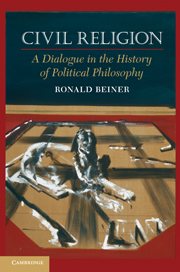Book contents
- Frontmatter
- Contents
- Preface and Acknowledgments
- Introduction
- Part I Machiavelli, Hobbes, Rousseau
- Part II Responses to (and Partial Incorporations of) Civil Religion within the Liberal Tradition
- 9 Baruch Spinoza
- 10 Philosophy and Piety
- 11 Spinoza's Interpretation of the Commonwealth of the Hebrews, and Why Civil Religion Is a Continuing Presence in His Version of Liberalism
- 12 John Locke
- 13 “The Gods of the Philosophers” I
- 14 Bayle's Republic of Atheists
- 15 Montesquieu's Pluralized Civil Religion
- 16 The Straussian Rejection of the Enlightenment as Applied to Bayle and Montesquieu
- 17 “The Gods of the Philosophers” II
- 18 Hume as a Successor to Bayle
- 19 Adam Smith's Sequel to Hume (and Hobbes)
- 20 Christianity as a Civil Religion
- 21 John Stuart Mill's Project to Turn Atheism into a Religion
- 22 Mill's Critics
- 23 John Rawls's Genealogy of Liberalism
- 24 Prosaic Liberalism
- Part III Theocratic Responses to Liberalism
- Part IV Postmodern “Theism”
- Conclusion
- Index
- References
20 - Christianity as a Civil Religion
Tocqueville's Response to Rousseau
Published online by Cambridge University Press: 05 June 2012
- Frontmatter
- Contents
- Preface and Acknowledgments
- Introduction
- Part I Machiavelli, Hobbes, Rousseau
- Part II Responses to (and Partial Incorporations of) Civil Religion within the Liberal Tradition
- 9 Baruch Spinoza
- 10 Philosophy and Piety
- 11 Spinoza's Interpretation of the Commonwealth of the Hebrews, and Why Civil Religion Is a Continuing Presence in His Version of Liberalism
- 12 John Locke
- 13 “The Gods of the Philosophers” I
- 14 Bayle's Republic of Atheists
- 15 Montesquieu's Pluralized Civil Religion
- 16 The Straussian Rejection of the Enlightenment as Applied to Bayle and Montesquieu
- 17 “The Gods of the Philosophers” II
- 18 Hume as a Successor to Bayle
- 19 Adam Smith's Sequel to Hume (and Hobbes)
- 20 Christianity as a Civil Religion
- 21 John Stuart Mill's Project to Turn Atheism into a Religion
- 22 Mill's Critics
- 23 John Rawls's Genealogy of Liberalism
- 24 Prosaic Liberalism
- Part III Theocratic Responses to Liberalism
- Part IV Postmodern “Theism”
- Conclusion
- Index
- References
Summary
From the beginning, politics and religion were in accord, and they have not ceased to be so since.
– Alexis de TocquevilleVarious contemporary theorists have looked to Tocqueville as the theoretical source of a distinctively American solution to Rousseau's problem of the political need for a civil religion. Indeed, Tocqueville's classic work, Democracy in America, does seem to show how an actual society can square the circle of a Christian republicanism that Rousseau declares to be an impossibility. Nevertheless, a closer inspection of the tensions at work in Tocqueville's thought reveals that he gets readily drawn into the very same perplexities that grip Rousseau, and the apparent solution furnished by the political religiosity of the Americans proves to be in some ways no less elusive than the civil religion that appears like a mirage at the end of the Social Contract.
Let us begin by sketching Tocqueville's critique of Rousseau. Rousseau's fundamental argument in Social Contract IV.8 is, of course, that there is an essential incompatibility between the cultic requirements of a healthy republican politics and the basic impulse of Christian religiosity. Tocqueville's critique consists in showing that American religion satisfies all the conditions of the vision of a liberal republicanism with which Rousseau concludes his book, while also showing that this civil religion of the American republic is fully and indeed emphatically Christian. Consider the following passage from the final chapter of Volume 1 of Democracy in America:
In the United States, even the religion of the greatest number is itself republican; it submits the truths of the other world to individual reason, as politics abandons to the good sense of all the care of their interests, and it grants that each man freely take the way that will lead him to Heaven, in the same manner that the law recognizes in each citizen the right to choose his government.
Thus the democratic citizens of the American republic have put into practice the religious liberalism upon which Rousseau insists in the closing paragraphs of the Social Contract. Moreover, the religious life of the American citizens described by Tocqueville does exactly what Rousseau says a civil religion should do: It fosters good citizenship, attaches the citizenry to the laws and institutions of the political community, and serves a thoroughly patriotic purpose. American religious life is a civil religion in precisely the sense according to which Rousseau defines a civil religion. Nevertheless, this civil religion of the Americans is, Tocqueville insists, through and through Christian, undeniably so. “In the United States, Christian sects vary infinitely and are constantly modified, but Christianity itself is an established and irresistible fact that no one undertakes either to attack or defend.” According to Tocqueville, the first Americans “brought to the New World a Christianity that I cannot depict better than to call it democratic and republican.” Thus what Rousseau declares to be a flat impossibility, a Christian republicanism, is demonstrated by Tocqueville to be not only a conceptual possibility but indeed a historical reality in Protestant America.
- Type
- Chapter
- Information
- Civil ReligionA Dialogue in the History of Political Philosophy, pp. 249 - 258Publisher: Cambridge University PressPrint publication year: 2010



